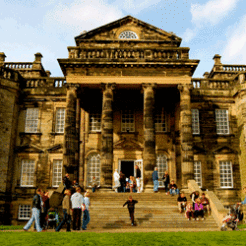The National Trust had its best ever financial performance last year, according to the charity’s 2009/10 annual report published today.
The success has been attributed to the rise in people staying in the UK for their holidays, with the result that visitor numbers to the Trust’s pay-for-entry properties was up by 16.2 per cent to 17.2 million visits. Membership has also grown by 106,000 to a total 3.7 million, contributing £125.2m to income (£122m in 2008/9).
The charity’s net profit for the year was a record £58.7m, up from £53m in 2008/9 and 2.5 per cent higher than the long-term target of 20 per cent. This was achieved despite lower income from investments.
Total income was actually lower in 2009/10 than the year before - £406.1m against £423.1m, but more than £35m of income in 2008/9 was the one-off gifts of Woolbeding Gardens and share capital of Historic House Hotels Limited. The Trust's 'ordinary' income was £261.5m in 2009/10 and £247m in 2008/9.
Expenditure on conservation projects also broke new ground, surpassing £100m for the first time.
Other highlights from 2009/10 include:
• Income from commercial activities, including catering, retail and holiday cottages, increased by 45 per cent to £54.7m (£50.4m).
• The number of volunteers helping open Trust places to the public and carry out vital conservation work increased to 61,000
• A public appeal raised over £3m to save Seaton Delaval Hall in Northumberland (pictured), and over 400 acres of surrounding land for the nation following its acceptance in lieu of tax.
Andrew Copestake, the Trust’s finance director, said the positive outcome was the product of a long-term approach to planning and taking decisive action in response to the economic downturn.
He said: “We accept that investment values and the income from those investments may bounce around year-on-year, but we have a long-term strategy to smooth out the flow of funds to our properties.
“We were nervous heading into last year and took action to make sure we were able to respond accordingly, for example setting up a commercial taskforce, keeping tight control on costs and installing new performance-monitoring systems that meant we could act quickly if needed.
“Whilst our visitor numbers and member recruitment were good, we also saw the benefits of long-term investments in properties and visitor experience coming through.”
Simon Jenkins, the Trust ‘s chairman, said: “In difficult economic times the benefits the Trust provides to the nation become even more precious. These benefits rely on promoting the appreciation of beauty, fresh air, the natural world and a kinship with the past. The Trust exists to welcome people to these pleasures and our results last year reflect a hunger for them.”
Earlier this year the Trust launched a new, “locally responsive” strategy, called Going local, which puts properties at the heart of the organisation as part of a longer-term strategic aim to increase membership to five million by 2020.










